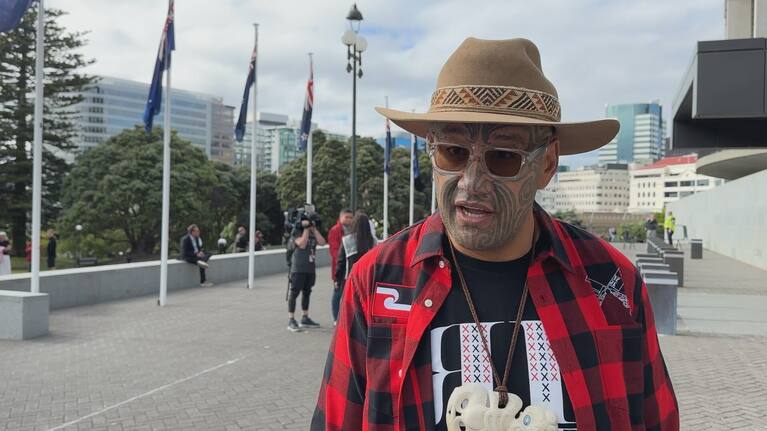Analysis: If we value personal choice and freedom, why not relax the rules on oaths, writes 1News political reporter Felix Desmarais.
Today's opening of Parliament will be one for the history books.
Few New Zealand governments, if any, have faced nationwide protest action before its MPs were even sworn in.
It's remarkable.
If it's a sign of things to come — and some insist that it is — then this coalition government is in for a torrid three years of robust resistance.
The protests today were part of a "National Māori Action Day" led by Te Pāti Māori.
The party's co-leader Rawiri Waititi said they preferred the term "activations" not protests. He said it didn't matter whether the Government listened or not as it was about "activating" tangata whenua and tangata tiriti.
A more cynical view among some might be that it "activates" a voting base. Intentional or not, that's what it does, and the number of Te Pāti Māori voters have grown over the last two elections.
The protest certainly shows the power of Te Pāti Māori to mobilise people.
It's rare to see any protest, let alone a sizeable one, walk on the grounds of Parliament before 8am — but that's exactly what happened.
Parliament's smallest party managed to upstage the opening of Parliament.
The action was not just in Wellington. Crowds gathered across the country, including a huge hīkoi in Rotorua, arguably the Māoridom capital of Waiariki, Waititi's electorate.
The party's power and influence, and its connection with those sympathetic to its cause — particularly through social media — cannot be underestimated.
But also the cause itself may be the real motivation. It explains why Te Pāti Māori's message seemed to resonate with almost 88,000 voters at the election, flipping all but one of the seven Māori seats to the party.

It seems to resonate particularly with those 30 and under. It's a cohort of New Zealanders — Māori, Pākehā and tauiwi (non-Māori) — who have grown up in an era where te reo Māori and Māoritanga (Māori culture) has increasingly moved from being something unheard, to tolerated, to celebrated and normalised.
To that group in particular, some of the coalition government's proposals and policies are galling. And that will get someone out of bed in the morning.
To them, New Zealand is stepping into a future that is more uniquely ours, and less colonised. And those people see it as under threat.
For their part, Christopher Luxon says the protests were "unfair" and those protesting have not given the Government a chance to prove its intent to improve outcomes for everyone. ACT leader David Seymour said protesters weren't winning anyone over and were avoiding a legitimate debate on the future of the Treaty.
There was some speculation about what Te Pāti Māori MPs may do when it came to swearing allegiance to King Charles III.
It's a mandatory part of proceedings, but Te Pāti Māori are notably not huge fans of the monarchy, to say the least. That monarchy represents, to them, colonisation that did not just begin and end when non-Māori settlers arrived in New Zealand, but that is ongoing — forcing the cultures and customs of the United Kingdom on a foreign land.
They made that known in the House, swearing allegiance first to tikanga, mokopuna and Te Tiriti o Waitangi before formally swearing allegiance to the King.

After the swearing in co-leader Debbie Ngarewa-Packer said there needed to be some flexibility in what MPs could swear allegiance to in a modern New Zealand.
It does follow that if you have no time for the King, it really renders one's oath or affirmation meaningless. Today, Te Pāti Māori MPs meant it when they swore to uphold tīkanga and Te Tiriti and pledged to have one eye on their descendants' future when making decisions. I would wager while they spoke the formal oath, they did not mean it.
So why bother?
MPs are representatives of the people. If they do not wish to swear allegiance to the King, arguably, that is faithful to the people who put them there.
Our democracy is more important than the monarchy that gives it its structure.
That doesn't mean we have to do away with swearing allegiance to the King. For some, perhaps even many, it is meaningful. Full power to them.
But for those who feel no affiliation or affection to the King, why not empower them?
After all, today proves tomorrow's history is written by the present.



















SHARE ME